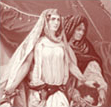


Alison Booth
Glover, [Elizabeth Rosetta Scott], Lady. Great Queens: Famous Women Rulers of the East. Edited by Rosetta M. Fairfax. London: Hutchinson, 1927; [1928].
No publication date. Red cloth binding. "Dedicated to my dear little Granddaughter Benita" in small caps. Epigraph from Maurice Baring: "Nevertheless new cities shall arise and new shapes of beauty, and son that shall seem to the hearers immortal, until the world itself shall end. And when the word is ended there shall be new worlds, and these too shall live and die, eternal and punctual, even as the blossoms of spring." Foreword dated November 12, 1927, by Rosetta Fairfax, pp. 7-9: "It has been a labour of love to write a foreword for this last book of my dear mother. The MS. was in Messrs. Hutchinson's hands when she passed away peacefully on February 8th of this year....[T]he modern practice of having books written by paid professionals is one which I find repellent....In the last few months of her life my mother was disappointed at her inability to get photographs of some of the various Queens of whose lives she was writing" (7). Fairfax leaves the text largely unaltered, adds photographs, and apologizes for the many unattributed quotations in her mother's biographies "compiled from rough notes" of books Fairfax has been unable to retrieve (8-9). Author's Note: the book was written to refute the idea "that women have never accomplished anything really great in any branch of the world's work. In England this may have been true to a certain extent prior to the passing of the Married Women's Property Act of 1870" (11). Her selection of Eastern women "have been chosent" to show "to what heights the women of the Asiatic, African, and Polynesian races can rise, given the opportunity, though they are frequently rather disparagingly spoken of as 'poor down-trodden Orientals' or 'natives'" (12). Preface ostensibly by Glover: "...I have discarded mere tradition as far as possible, and the following sketches of the lives of notable women rulers are founded on fact....I have been most forcibly struck by the colossal importance of the female throughout Nature." Motherhood warrants woman's "responsibility." A long paragraph attests to the intelligence of the elephant, and dominance of "the Queen Elephant," followed by a short rhetorical question/paragraph on the queen bee. History shows "how notably prosperous Britain has always been under the sovereignty of a Queen" (16). Contents organized under India, China, Japan, Palmyra, Assyria, Egypt, Ethiopia, Abyssinia, New Zealand, Hawaii, South Sea Islands. Those named Begam in the table of contents are listed under "The Rulers of Bhopal." Eleven portraits, including frontispiece of The Dowager Empress of China. The prose of the biographies is unremarkable modern historical narrative. "It is difficult to understand the Oriental mind and its outlook on life, so imbued is it with the spirit of the past, with ritual, and with superstitions absolutely unthinkable by the practical and progressive European.... little can be really known of the inner workings of a country like China" (147). The queens are portrayed in a positive light.
TOC: Queen Chand; Lakshmi Bai, Rani of Jhansi; Kudsia Begam; Nawab Sikander Begam; Nawab Shah Jahan Begam; H.H. Nawab Sultan Jahan Begam, G.C.S.I., G.C.I.E.; H.H. the Maharanee of Gwalior; H.H. the Maharanee of Cooch Behar; H.H. the Maharanee of Travancore; The Dowager Empress (I) of China; The Dowager Empress (II) of China; Empress Jingo Kogu; Queen Zenobia; Queen Semiramis; Queen Hatshopsouito; Magda, Queen of Sheba; Empress Zauditu; Ahumai; Kaahumanu, or Feather-Mantle; Liliuokalani; Salote, Queen of Tonga; Queen Emma.
Search OCLC WorldCat for this title.
Search Google Books for this title.